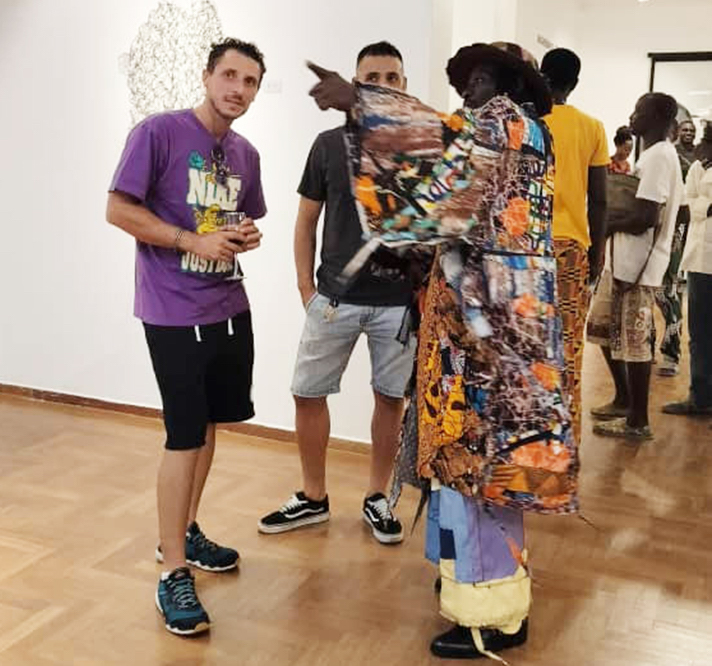Another exhibition of the Junkman’s installations of repurposed discarded objects in Lagos continues the theme song of his Junkyard Museum of Awkward Things. Okechukwu Uwaezuoke writes
Memories of a previous exhibition by the Junkman of Afrika, which held barely two years at the Alliance Française, Mike Adenuga Centre in the leafy, upmarket Lagos neighbourhood of Ikoyi, are yet to fade, yet the one-of-a-kind artist returns to the same venue with another offering. Talking about the latest exhibition, which opened on Saturday, April 6, and is titled The Washerman’s Dream, it superflously announces that it is “an exhibition of art made from recycled materials.”
Indeed, the exhibition’s subtitle should be deemed superfluous, because hardly any aficionado of the local art scene who has heard about the artist and his legendary Junkyard Museum of Awkward Things still needs to be reminded about his repurposing of discarded objects.
The artist’ who is easily recognisable in art circles by his lush dreadlocks and sometimes goes by the pseudonym Dilomprizulike—a contraction of his civil name, Okwudili Humphrey Umezulike—hopes to draw attention to the concerning influx of secondhand goods flooding the local marketplaces from Western countries with this latest initiative. These items, he affirms in a statement, have morphed into fronts for the identities of the local consumers as individuals and members of the community, even though he acknowledges their potential benefits to the less fortunate. According to him, Nigerians’ social fabric is shaped by their outer layer.
Still using the metaphor of rags, he argues that there is a nexus between people’s personas and their thinking patterns and ultimate behaviours. “The materials and methods that I use to present this idea are varied in texture and context, but they speak the same language, trying to explain or expose—expatiate on the placement of or help in creating the awareness that this project is all about,” he adds.
In an intriguing parallel, his perspective on secondhand goods resonates with the observations made centuries ago by the French writer Hippolyte Taine during the 1861 Derby races at Epsom, UK. Taine astutely remarked on the mishmash of attire among ‘low’ individuals, detecting vestiges of trendy London’s West End fashion in their dress.
Taine, who is recognised as the main thinker behind French naturalism, had the opinion that used clothes are always ill-fitting since they were made for someone else. This thought gave his ideas more depth by hinting at his contemporary take on clothing as a means of self-expression.
Of course, it is known that the idea behind the Junk Yard Museum of Awkward Things—one that cannot be separated from the identity of its founder—revolves around interrogating society’s detritus and not just second-hand clothes. This, therefore, goes beyond a museum’s concept of preserving creative items and showcasing them as cultural treasures within their originating society.
It is little wonder the US-based professor of art history, Sylvester Ogbechie, deems these efforts by the Junkman “an increasingly sophisticated response to the obverse of globalisation’s allure, its ever-expanding legacy of industrial and consumerist waste.”
Professor Ogbechie further speculates that, unlike “most” doomsday-obsessed artists, the Junkman appears to forecast that social order is at risk not from some massive technological accident (such as a nuclear mushroom cloud), but rather from being undone by garbage. “An organism dies when it can no longer separate itself from its own waste. The Junkman confronts polite society with the messy fact of its reliance on profligate waste. His work is increasingly topical and accomplished.”
Indeed, right from the onset, when the Junkman established his museum in Lagos in the year 2000, he has never stopped railing against this consumerist society, whose values are as fleeting as the objects they discard. Memories of a first visit to the museum, then housed in a repurposed lock-up store within a bustling mall by the Lekki Expressway, come flooding back. In the museum’s dark and dank interior, misshapen forms seemed to loom in great numbers from every corner. They glare inquisitively at the bewildered guest standing atop a makeshift walkway, whose imagination begins to conjure illusions as a haunting sensation grips him. Suddenly, it is almost as if the peculiar figures—be they human, animal, or fantastically twisted—have come to life. Suddenly, their origin from discarded rusty metal, tattered fabrics, decaying timber, soda and beer cans, and shreds of worn-out tires becomes inconsequential amidst the array of repurposed odds and ends on display.
The unattractive objects, even as unappealing as they seemed, would obviously have delighted environmentalists as art installations. After all, the artist’s efforts helped remove non-biodegradable waste and thus supported ecological causes.
Years later, in 2009 precisely, the museum moved with the Junkman, his German-born wife, and their mixed-race kids to Europe. After all, it was his idea, for, as he puts it, the snail drags along its shell as it moves. “I travelled the globe in pursuit of possibilities for professional development and to elevate this project concept to the level of a world-class museum in terms of operational capabilities and enrichment. I had to take this vision along with me in order to save it. When I returned in 2018, I just pitched back onto the Lagos art scene.”
Thus, the Junkyard Museum as a concept returned, revitalised, and energised to a scene it had left behind in 2009, the year reincarnated at the Oriel Mostyn Gallery in Llandudno, Wales. At the same time, the Junkman, who is widely exhibited on the global stage, was acknowledged by the UK-based newspaper The Independent as one of Africa’s 50 greatest cultural figures.
So, for visibility sake, the exhibition, The Washerman’s Dream, which ends on April 27, continues to preach the message of the time-tested concept.
